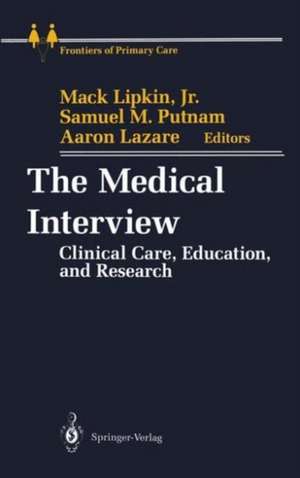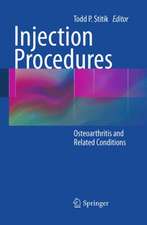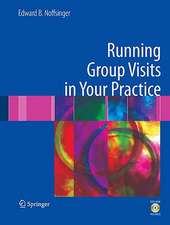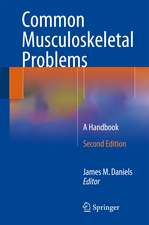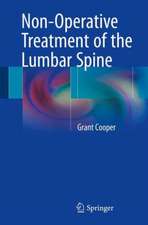The Medical Interview: Clinical Care, Education, and Research: Frontiers of Primary Care
J.G. Carroll Editat de Mack Jr. Lipkin R.M. Frankel Editat de Samuel M. Putnam A. Keller Editat de Aaron Lazare T. Klein, P.K. Williamsen Limba Engleză Paperback – 30 sep 2011
Preț: 734.38 lei
Preț vechi: 773.03 lei
-5% Nou
Puncte Express: 1102
Preț estimativ în valută:
140.52€ • 153.12$ • 118.41£
140.52€ • 153.12$ • 118.41£
Carte tipărită la comandă
Livrare economică 23 aprilie-07 mai
Preluare comenzi: 021 569.72.76
Specificații
ISBN-13: 9781461275596
ISBN-10: 1461275598
Pagini: 668
Ilustrații: 643 p.
Dimensiuni: 152 x 229 x 35 mm
Greutate: 0.88 kg
Ediția:Softcover reprint of the original 1st ed. 1995
Editura: Springer
Colecția Springer
Seria Frontiers of Primary Care
Locul publicării:New York, NY, United States
ISBN-10: 1461275598
Pagini: 668
Ilustrații: 643 p.
Dimensiuni: 152 x 229 x 35 mm
Greutate: 0.88 kg
Ediția:Softcover reprint of the original 1st ed. 1995
Editura: Springer
Colecția Springer
Seria Frontiers of Primary Care
Locul publicării:New York, NY, United States
Public țintă
ResearchCuprins
I. A Framework for the Medical Interview.- 1. Three Functions of the Medical Interview.- 2. Hypothesis Testing.- 3. Therapeutic Aspects of the Clinical Encounter.- 4. The Interview as a Clinical Negotiation.- II. The Structure and Process of the Medical Interview.- 5. Performing the Interview.- 6. The Mental Status Examination.- 7. Use and Management of Physicians’ Feelings During the Interview.- 8. Barriers to Effective Communication.- 9. Patient Education in the Medical Encounter: How to Facilitate Learning, Behavior Change, and Coping.- 10. Enhancing Cooperation with the Medical Regimen.- III. The Context of the Interview.- 11. Patients and Their Lives: Psychosocial and Behavioral Aspects.- 12. Cultural Factors in the Medical Interview.- 13. Gender Effects in Physician/Patient Interaction.- 14. The Bilingual Interview and Medical Interpretation.- 15. Conducting a Family Interview.- 16. The Telephone Interview.- 17. Terminating the Doctor/Patient Relationship.- IV. Specific Interview Situations.- 18. Interviewing Pediatric Patients.- 19. The Geriatric Interview.- 20. The Sexual History.- 21. Personality Styles.- 22. Interviewing the Psychotic Patient.- 23. Effective Interviewing and Intervention for Alcohol Problems.- 24. Interviewing the Suicidal Patient.- 25. Caring for Patients with Life-Threatening or Terminal Illness.- 26. Delivering Sad or Bad News.- 27. Bereavement.- V. Values, Ethics, and Legal Issues.- 28. Shame, Humiliation, and Stigma in the Medical Interview.- 29. Medical Ethics and Doctor/Patient Communication.- 30. The Role of the Medical Interview in the Physician’s Search for Meaning.- VI. Teaching and Faculty Development.- 31. Educational Theory and Teaching Medical Interviewing.- 32. A Developmental Awareness for Teaching Doctor/PatientCommunication Skills.- 33. Standardized (Simulated) Patients and the Medical Interview.- 34. Teaching with Role-Play: A Structured Approach.- 35. Teaching Interviewing Using Direct Observation and Discussion of Actual Interviews.- 36. Teaching Medical Interviewing: The Lipkin Model.- 37. Evaluating a Faculty Development Course on Medical Interviewing.- VII. Evaluation of the Interview.- 38. Evaluation of Medical Interviewing: Concepts and Principles.- 39. Evaluation Instruments for Medical Interviewing Skills.- VIII. Research on the Medical Interview.- 40. An Overview of Research on Medical Interviewing.- 41. A Guide to the Research Literature on Doctor/Patient Communication.- 42. Coding Categories for Investigating Medical Interviews: A MetaClassification.- 43. Affective and Nonverbal Aspects of the Medical Visit.- 44. Psychological Research on Diagnostic Reasoning.- 45. Accuracy of the Medical History: A Review of Current Concepts and Research.- 46. Patient Recall and Comprehension After the Medical Visit.- 47. The Patient-Centered Interview: Research Support.- 48. Patients’ Assessments of Quality.- Appendices.- A. Instructional Use of Audio and Video Recording John Femino and Catherine Dubé.- B. Bibliography.
Recenzii
"...a substantial work, planned and nurtured by the American Academy on Physician and Patient to represent the definitive text on patient interviewing." - American Journal of Pharmaceutical Education
